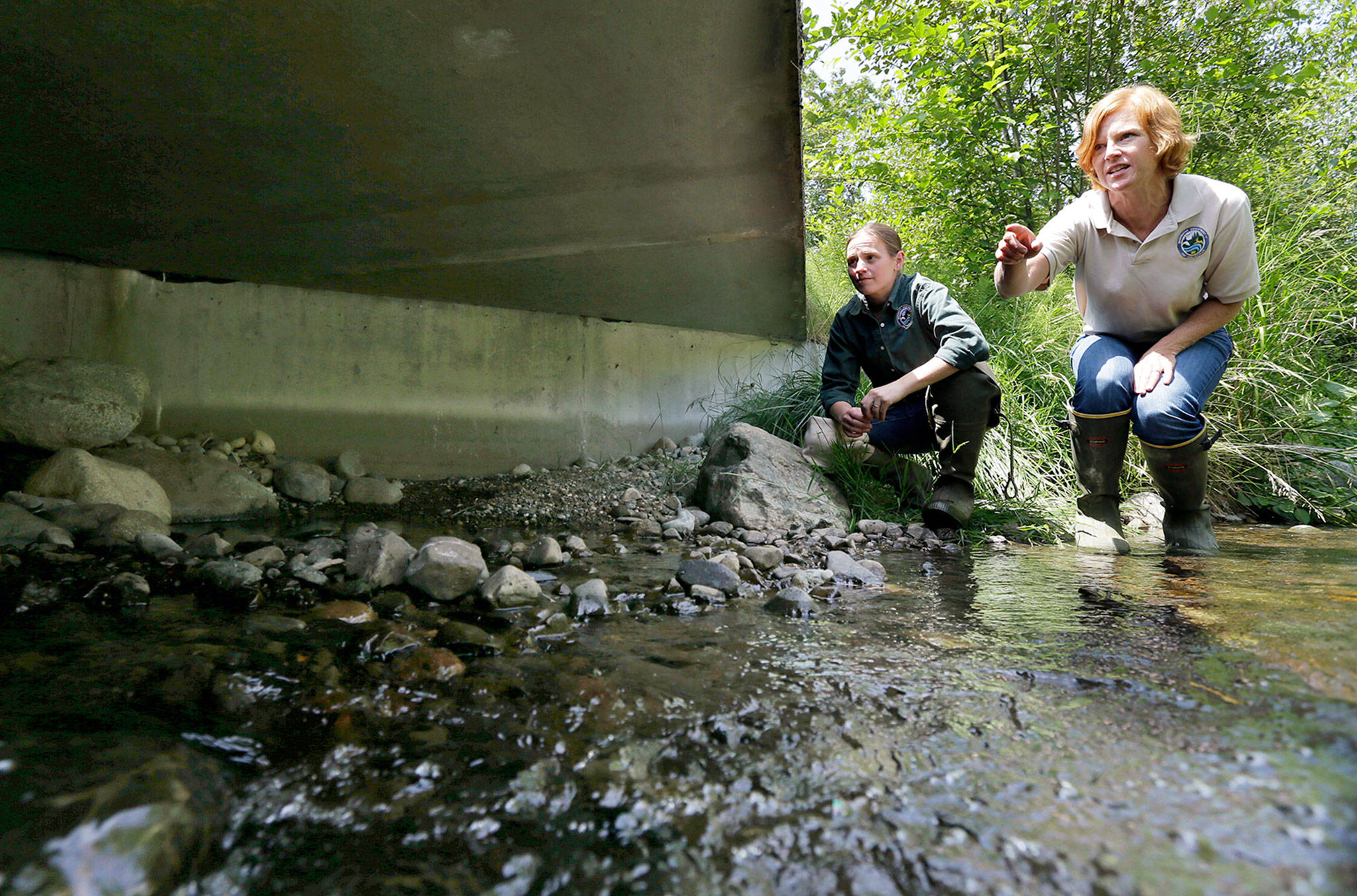By Phuong Le / Associated Press
SEATTLE — Washington state must continue restoring salmon habitat by removing barriers that block fish migration after the U.S. Supreme Court on Monday left in place a lower court order.
The justices divided 4-4 in the long-running dispute that pits the state against Northwest Indian tribes and the federal government. The tie serves to affirm a lower court ruling in favor of the tribes.
Justice Anthony Kennedy stepped aside from the case because he participated in an earlier stage of it when he served on the 9th U.S. Circuit Court of Appeals.
At issue is whether Washington state must pay billions of dollars to fix or replace hundreds of culverts — large pipes that allow streams to pass beneath roads but can block migrating salmon if they become clogged or if they’re too steep to navigate.
Leaders of several western Washington tribes cheered the decision Monday, calling it a victory that affirms their treaty rights while protecting salmon central to their way of life.
Jay Julius, chair of the Lummi Indian Business Council, called the decision a win for treaty rights, river rights and salmon.
“This is not just about tribes’ treaty right to fish, but also the inherent right to harvest from a plentiful, healthy supply of salmon,” he said in a statement.
Lorraine Loomis, chair of the Northwest Indian Fisheries Commission, said the decision would “open hundreds of miles of high quality salmon habitat that will produce hundreds of thousands more salmon annually for harvest by Indians and non-Indians.”
The Supreme Court in April heard the state’s appeal of a ruling by the 9th U.S. Circuit Court of Appeals. That court affirmed a lower court order in 2013 requiring the state to fix or replace hundreds of the highest-priority culverts within 17 years.
Washington has argued that its treaties with the tribes created no obligation to restore salmon habitat. It said the ruling would force it to perform work that wouldn’t benefit salmon because other barriers may completely block fish, and it would also make the state’s taxpayers responsible for fixing problems created by the federal government when it specified the design for the state’s old highway culverts.
“It is unfortunate that Washington state taxpayers will be shouldering all the responsibility for the federal government’s faulty culvert design,” state Attorney General Bob Ferguson said in a statement.
He said salmon can’t reach many state culverts because they are blocked by culverts owned by others, such as counties and the federal government.
“The Legislature has a big responsibility in front of it to ensure the state meets its obligation under the court’s ruling,” Ferguson said.
In seeking a Supreme Court review, Ferguson was at odds with other state officials, including Public Lands Commissioner Hilary Franz.
“It is time to stop fighting over who should do what,” Franz said Monday.
The U.S. government sued Washington in 2001 on behalf of the 21 tribes to force it to replace the culverts with structures that allow fish to pass through. Because the pipes block salmon from reaching their spawning grounds, they deprive the tribes of fishing rights guaranteed by treaty, the lawsuit said.
In 2013, U.S. District Judge Ricardo Martinez ordered Washington to fix or replace more than 1,000 culverts blocking access to 1,600 miles (2,575 kilometers) of salmon habitat.
The state transportation department has so far fixed 319 barriers, according to a 2017 report.
“It will be a big victory for fisheries,” said Bob Anderson, a law professor and director the Native American Law Center at the University of Washington.
He said that since 1905, the court has consistently upheld the tribal position that they have a right to a fair share of the salmon, and implied rights that go along with that. “This case is a logical extension of those prior decisions.”
Fawn Sharp, president of the Quinault Nation, said the “decision marks seven generations of conflict in our struggle to fully exercise and protect the Pacific Northwest salmon resource the way our ancestors envisioned.”
State Sen. Reuven Carlyle, chairman of the Senate Energy, Environment and Technology Committee, said Monday’s ruling was “a forcing function to double down on every level to re-prioritize our approach to salmon.”
Carlyle said that while he doesn’t think the Legislature needs an immediate special session to address the ruling, work will be done ahead of the next legislative session that begins in January.
AP writers Mark Sherman in Washington, D.C., and Rachel La Corte in Olympia contributed.
Talk to us
> Give us your news tips.
> Send us a letter to the editor.
> More Herald contact information.

























